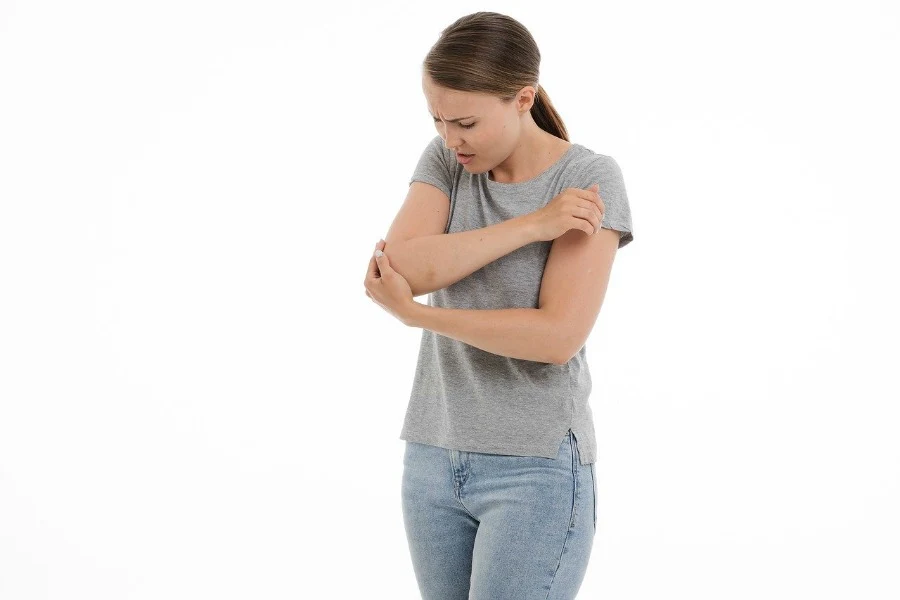Are you having a difficult time managing your joint pain? If so, did you know that there are some simple adjustments you might be able to make to your lifestyle to reduce joint pain and stiffness?

Below, you can find some simple lifestyle changes which you can put into effect to better support joint health, fight joint pain, and feel more like yourself each day.
1. Take a supplement for reducing inflammation.
A simple lifestyle change you can make for healthier joints is to start taking a daily supplement that contains natural, anti-inflammatory ingredients.
Contained in every capsule is a formula which includes Boswellia Serrata, Celadrin, Turmeric Curcumin, Zinc, Vitamin E, Selenium, Riboflavin and Vitamin D. All are scientifically supported to improve joint health.
You should take the supplement every day, and then wait a few months to see the full results. Inflammation will not go down overnight, but it will decrease gradually once you start taking the supplement and as you restore balance in your body. And joint pain will begin to ease as well.
2. Work out regularly.
When you suffer from joint pain, you probably don’t want to move them. But you should think about making regular exercise part of your routine.
The Arthritis Foundation writes, “Exercise helps with fatigue in many ways. It increases muscle mass, strength, blood circulation, and flexibility, all of which will boost energy and reduce pain. Exercise also generates endorphins, which are brain chemicals that produce a sense of well-being and vitality – and they can improve nighttime sleep.”
Start out gradually with low-impact exercises, and expand to other workouts as you begin restoring function.
3. Eat more anti-inflammatory foods to ease joint pain.
Another simple lifestyle change to help fight joint pain is to eat a diet rich in anti-inflammatory foods. If you live in the West, you probably are eating a pro-inflammatory diet even if you don’t know it. We tend to eat too many foods fried in unhealthy oils and way too much sugar. Try cutting back on both, and instead eating more anti-inflammatory foods.
You can get started by adding fatty fish to your diet like salmon or tuna. You also can eat more leafy green vegetables, fruits, nuts, beans, flax seeds and butter.
4. Apply topical treatments throughout the day.
Harvard Medical School suggests, “Take a warm bath, apply cold compresses, or wrap some frozen vegetables in a towel and hold them to your painful joints. Heat, cold, or alternating the two can be very effective at relieving pain.”
There are also different creams and rubs you can purchase which you can apply topically to your joints to help fight joint pain.
You will get the best results from topical treatments if you are diligent with them. In other words, apply them throughout the day as you feel the need, rather than just for twenty or thirty minutes at one random interval.
The cold will help to reduce the inflammation in your joints, while warmth will help to loosen tight muscles.
5. Get your sleep.
The Arthritis Foundation points out that it is important to get adequate sleep each night to keep your symptoms to a minimum, including the fatigue which may be associated with joint pain.
How can you do that? The foundation recommends, “Sleep hygiene is an important part of getting a good night’s rest. Avoid alcohol, nicotine, and caffeine because they can disrupt sleep. Go to bed and get up at about the same time every day. Make your bedroom cool, dark, and comfortable. Turn off your computer, cell phone, and television. Follow a bedtime ritual to signal your body that it’s time to sleep.”
6. Don’t push yourself past your limits.
One more lifestyle change you can make to try and control your joint pain is to reduce your stress. And a good way to start doing that is to acknowledge that as a person with chronic pain, you have limits to how much you can do each day when your pain is flaring.
That sometimes may mean you need to quit an activity sooner than you would like or skip out on one altogether. But if it means you are more functional overall, it could improve your quality of life considerably.
And as you prevent more flares through lower overall stress, maybe you will gain back some more flexibility in your activities over time.
Give Lifestyle Changes Time to Work to Help Fight Joint Pain
It can take months for your body to adjust to the lifestyle changes you put into play to help fight joint pain. So, give your inflammation levels time to drop, and be disciplined with your new lifestyle. Over time, it should pay off in improvements to joint pain and stiffness.
